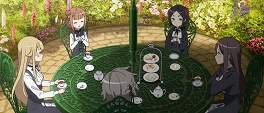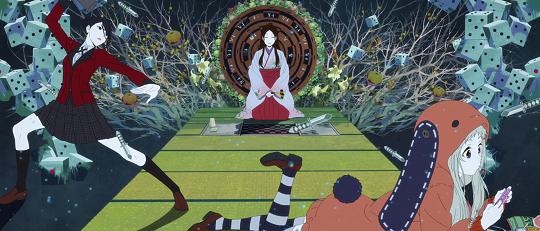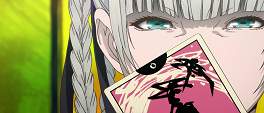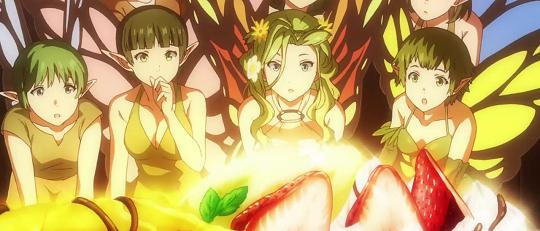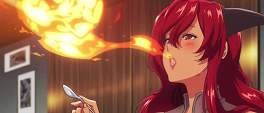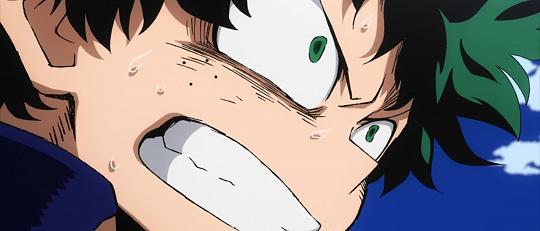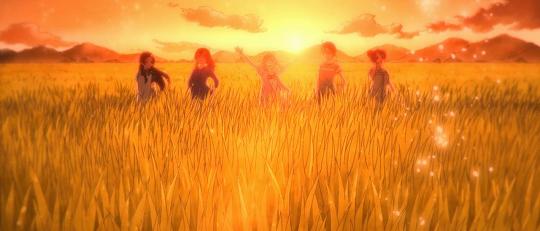Or “it’s halfway through the new season and I still can’t think of much to say about these shows.”
Princess Principal
I was mislead into thinking Princess Principal would run for a full two-cours by the “case number” episode titles and I was somewhat surprised when it finished after only twelve. Far smarter than it has any reason to be, the opening episodes are taut and intriguing and while the remaining ten only occasionally deliver on that high watermark, it oozes style and craftsmanship with some outstanding if predictable Victorian England stereotyping. The characters are likeable and mercurial in equal parts and there is a genuine sense of camaraderie in amongst the affecting drama. The backdrop of a city divided by a wall however is never explored or capitalised upon and ends up being little more than set dressing. By many accounts this was the show of the season and it could have easily supported another, especially if it meant an extended score by Yuki Kajiura.
Kakegurui - Compulsive Gambler
Purposely oscillating between drop-dead gorgeousness and gurning ugliness is certainly one way that Kakegurui tempers its copious fan-service. I was reticent to start on another series focused on gambling after being left cold by Kaiji’s torturous logic games; but here the enjoyable outlandishness of the characters and the tongue-in-cheek energy that runs through the entire production carries it smartly through to a predictable but satisfying ending. Any more than the aired twelve episodes would likely bog down the series in unneeded backstory and likely indulge in the vicious streak that accompanied some of the later games. The superb opening has stylistic hints of The Woman Called Fujiko Mine while the ending is abject nonsense that, in context at least, kind of works. Knowingly bonkers and all the more enjoyable for it.
Isekai Shokudou - Restaurant to Another World
A low key, low budget entry into the overripe “isekai” genre, this time without a smart phone but with a restaurant catering to the denizens of a generic fantasy world. Unlike other shows like Food Wars (Shokugeki no Soma) or Gourmet Girl Graffiti (Kofuku Graffiti) that make the meals a character in their own right, here they are only slightly more bland than the actual characters. Each episode generally covers two characters and individually the stories feed into the light, easy going feeling that permeates the lackadaisical diner, collectively though neither the characters nor the other world really measure up. That typically uninspiring “foreign” meals are used to feed foreign guests feels like it should be a point of contention but that would be ascribing too much to what is a lighthearted, fun, but unfulfilling little series.
My Hero Academia
Good grief these buff fifteen year olds are angry, and apparently just want to repeatedly beat the snot out of each other. I am a latecomer to the franchise, blitzing as I did both the first and second series - all thirty eight episodes - in little over a month. For what is an archetypal shounen series, it works surprisingly well. The second season doesn’t let up, lurching immediately from the excellent tournament arc to the hero killer through to exams. The characters are universally all superbly realised with even auxiliary characters like Ashido and Jirou afforded enough time to be interesting, though its mama Midoriya who acts as the heartfelt voice of reason. With a confirmed third season, whether it can last at the pace it’s set is yet to be seen. With little to no downtime between the different forms of competition and pugilism to really get to grips with the world, watching this can feel like being on a runaway train: exhilarating, but it eventually needs to slow down or crash.
Sakura Quest
The rural depopulation angle proved a far richer vein of interest than the series itself. The core quintet of young women grow into their roles within the town and as characters but are not explored in enough depth to be truly relatable. Yoshino’s ambivalence may be highlighted when she talks with her sister, but her time prior to Manoyama is still a mystery. Similarly Sanae’s back story - why she became a web entrepreneur and the difficulties that involved - is ignored. In a way it’s a mark of good writing that one would be interested in learning more about them, but conversely damning that the story itself doesn’t serve them anywhere near well enough. The failure to connect and spark interest in a series focused on a single town is perhaps enough evidence of Manoyama’s eventual fate. Ultimately enjoyable and explores that awkward time between teenager and adulthood, but ultimately fizzles rather than shines.
--
Elsewhere I’m still catching up on Made in Abyss - another strong contender for show of the season according to many accounts - and Fate Apocrypha continues its careening power slide into lunacy.




